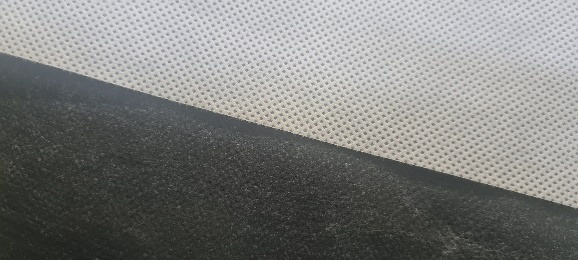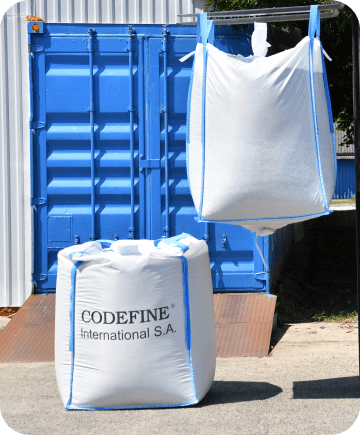Home » Posts Page » Blog » Polyethylene Liners: The Ultimate Solution for Bulk Bag Protection

Bulk bags are a popular storage and logistics solution across countless industries. Hard-wearing and compatible with a variety of machinery, they’re a practical solution for safely handling delicate materials and hazardous contents. However, contamination can be a serious concern, with even a modest amount rendering expensive contents unusable. Additionally, leakage can lead to environmental hazards, putting human health and safety at risk.
Fortunately, there’s an easy way to overcome these problems. By adding polyethylene lining to bulk bags, you can protect delicate bulk materials from damage and enhance the storage credentials of flexible containers.
Polyethylene liners are essentially pieces of flexible plastic that can be added to the inside of a bulk bag, providing an additional layer of protection for stored contents. Polyethylene lining not only protects materials but also extends the lifespan of bulk bags themselves. PE liners serve as an almost impermeable layer and, by helping prevent punctures and leaks, help safeguard stored materials from moisture damage and dust exposure.
However, polyethylene lining is only effective if you’re using a liner that’s the right size for your container. Furthermore, liners need to be properly secured once containers have been filled with material to minimize moisture intrusion and minimize exposure to airborne contaminants.
Polyethylene liners come in a couple of main varieties. Firstly, there are high-density polyethylene (HDPE) liners. HDPE liners are particularly strong and boast impressive chemical resistance. Because of their credentials, they’re a popular choice in industries where exposure to chemicals is a daily occurrence.
Another option is low-density polyethylene (LDPE) liners. More flexible than HDPEs, LDPEs can readily conform to awkward shapes, making them a go-to choice for irregularly shaped materials. They’re also suitable for use as geomembranes.
Although other lining options exist, few are as effective as polyethylene lining. One of the key advantages of PE liners is their durability. Designed with long-lasting use in mind, PE liners can weather environmental stresses relatively easily, coping well with the wear and tear that would render other liner options unfit for purpose. Because PE liners don’t need to be replaced frequently, they’re a cost-effective option.
Additionally, PE liners are incredibly robust and manufactured to withstand exposure to harsh chemicals. Polyethylene is resistant to a variety of chemicals, making it useful for applications like waste management, the chemical industry, and other sectors where toxic byproducts need to be contained and controlled.
Polyethylene liners are also remarkably flexible. This flexibility makes them suitable for storing all manner of materials, with liners conforming to accommodate any shape. Once filled, containers and liners can be securely sealed, minimizing exposure to the elements and contaminants.
Using polyethylene liners is considered best practice across many industry sectors. Not sure whether or not you should be using them? Below are just some of the situations where using PE lining is essential.
PE liners play a crucial role in preventing leaks from occurring. If you’re using bulk bags as a storage solution, undetected leaks can lead to contamination and a loss of product, which can put a serious dent in your bottom line. If you’re using FIBCs to store potentially hazardous materials, leaks can be particularly dangerous, exposing your workers to potentially lethal safety hazards.
When used for certain applications, such as waste management, PE liners can also help mitigate ecological impact. As it’s nearly impermeable, polyethylene keeps water at bay, preventing it from coming into contact with stored material and creating leachate and other toxic chemicals. PE liners can be used for containment of both solid and liquid waste, protecting against soil contamination and ensuring nearby water sources don’t become polluted.
You might be using FIBCs that can be reused multiple times, but this ultimately depends on the condition they’re in. Woven polypropylene is a resilient material, but it can even become damaged when storing abrasive material for long periods of time. However, you can extend the lifespan of your FIBCs considerably by adding a PE liner. By not having to replace your bulk bags as frequently, you can make a serious saving.
Thanks to their durability and versatility, polyethylene liners are used across many different industries. Below, we’ll take a look at some of their most common applications.
Although FIBCs are commonly encountered in the construction sector, they’re not always robust enough to cope with the pressures of intensive building projects. However, PE liners can significantly enhance the functionality of bulk bags. PE liners are an effective way of protecting sensitive construction materials from moisture damage. They act as membranes, serving as a waterproof shield against water in moisture-rich environments like basements.
In the manufacturing sector, PE liners are commonplace and their applications within this industry are numerous. They offer a safe and secure way to dispose of chemicals and other toxic byproducts created during the manufacturing process, while they can also be used to line storage containers. What’s more, PE liners can help protect materials as they’re being handled, reducing waste and maximizing profit margins.
Across the globe, landfills remain one of the most common methods of waste disposal. However, landfills aren’t particularly sustainable and have the potential to be devastating to the environment if proper precautions aren’t taken. If waste is buried in the ground, rainwater can permeate, creating toxic leachate that can then seep into the surrounding soil.
Fortunately, PE liners provide a convenient solution for reducing the ecological impact of landfills. Polyethylene liners can help seal landfill sites, with their durable design ideal for withstanding punctures and other wear and tear. What’s more, they are resistant to UV damage, meaning liners exposed to sunlight won’t easily degrade over time. Furthermore, PE liners are chemical resistant, which is particularly useful for landfill sites used to dispose of potentially toxic material.
PE Liners are regularly used in the food industry. In this industry, fine powders and delicate ingredients are commonplace, calling for strict contamination control procedures. Even small-scale contamination can render an entire batch of product unfit for human consumption, leading to a loss of raw materials and profit. An easy way to avoid this problem is by combining food-grade FIBCs with reliable PE liners.
The agricultural sector utilizes PE liners in many ways. They can be used to enhance the credentials of bulk bags, making them useful for long-term storage of agricultural feed and other sensitive materials. What’s more, they can form an integral part of irrigation systems, helping reduce the impact of soil erosion and manage water waste. They can even be used for pest control purposes, helping deter vermin and control weeds.

If you want to extend the operational lifespan of your bulk bags with PE liners, you’ll need to follow some best practice guidance. To begin with, make sure you’re choosing the right type of PE liner for your needs. Are you looking to store aggressive chemicals safely? You’ll need a hard-wearing HDPE liner. Planning a geomembrane project and worried about contamination? Perhaps you operate within the waste management sector. LDPE liners are far more suited to your needs.
In order for PE liners to prove effective, you’ll also need to ensure they’re being fitted correctly. No matter what type of PE lining you’re using, ensure they’re checked for punctures and other signs of wear and tear before installation. When adding material to your bulk bags, observe recommended filling guidelines to avoid damage. You’ll also need to make sure that liners are sealed correctly to protect contents from contamination and moisture.
Keen to reduce the risk of contamination? Looking for a way to store and transport bulk goods more efficiently? Perhaps you operate within the pharmaceutical or chemical manufacturing industries where handling hazardous materials is a daily occurrence. In all these situations, polyethylene liners provide you with a reliable way to enhance your containers of choice.
At Codefine, you’ll find an extensive range of container liners and polyethylene lining products available, with options to suit every industry. Why not take a look at the full range online today? Not sure whether to go with PE or PP bags? Perhaps you’ve got a question about PE liners. Feel free to get in touch with the team with your queries.